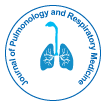Current Insights and Future Directions in ARDS Pathophysiology and Management Strategies
Received Date: Apr 01, 2024 / Published Date: Apr 30, 2024
Abstract
Acute Respiratory Distress Syndrome (ARDS) is a severe form of acute respiratory failure characterized by diffuse alveolar damage, leading to profound hypoxemia and respiratory compromise. This abstract provides an overview of current insights and future directions in ARDS pathophysiology and management strategies. Pathophysiologic ally, ARDS involves a complex interplay of inflammation, endothelial dysfunction, epithelial injury, and deregulated immune responses. Recent research has highlighted the role of molecular mechanisms such as cytokine cascades, oxidative stress, and cellular signaling pathways in the development and progression of ARDS. Management strategies encompass a multidisciplinary approach aimed at supportive care, mechanical ventilation strategies (including lung-protective ventilation and prone positioning), pharmacological interventions (such as neuromuscular blockade and fluid management), and adjunctive therapies (including extracorporeal membrane oxygenation). Future directions include novel therapeutic targets (such as biomarkers for early detection and targeted therapies), precision medicine approaches tailored to individual patient characteristics, and advancements in ventilator support techniques to optimize outcomes. This abstract synthesizes current understanding and future directions in ARDS, emphasizing the need for continued research to improve outcomes and reduce mortality in this challenging clinical condition.
Citation: Payal D (2024) Current Insights and Future Directions in ARDSPathophysiology and Management Strategies. J Pulm Res Dis 8: 188.
Copyright: © 2024 Payal D. This is an open-access article distributed under theterms of the Creative Commons Attribution License, which permits unrestricteduse, distribution, and reproduction in any medium, provided the original author andsource are credited.
Share This Article
Recommended Journals
Open Access Journals
Article Usage
- Total views: 387
- [From(publication date): 0-2024 - Apr 02, 2025]
- Breakdown by view type
- HTML page views: 211
- PDF downloads: 176
